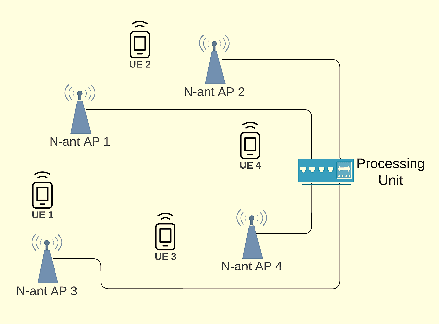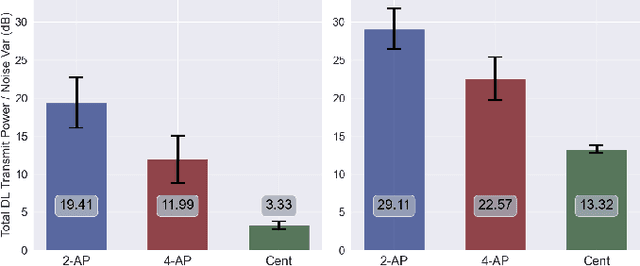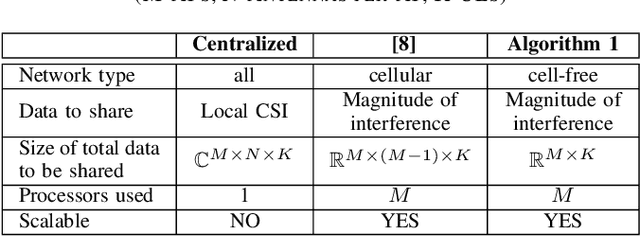Mehdi Zafari
ASSENT: Learning-Based Association Optimization for Distributed Cell-Free ISAC
Nov 13, 2025Abstract:Integrated Sensing and Communication (ISAC) is a key emerging 6G technology. Despite progress, ISAC still lacks scalable methods for joint AP clustering and user/target scheduling in distributed deployments under fronthaul limits. Moreover, existing ISAC solutions largely rely on centralized processing and full channel state information, limiting scalability. This paper addresses joint access point (AP) clustering, user and target scheduling, and AP mode selection in distributed cell-free ISAC systems operating with constrained fronthaul capacity. We formulate the problem as a mixed-integer linear program (MILP) that jointly captures interference coupling, RF-chain limits, and sensing requirements, providing optimal but computationally demanding solutions. To enable real-time and scalable operation, we propose ASSENT (ASSociation and ENTity selection), a graph neural network (GNN) framework trained on MILP solutions to efficiently learn association and mode-selection policies directly from lightweight link statistics. Simulations show that ASSENT achieves near-optimal utility while accurately learning the underlying associations. Additionally, its single forward pass inference reduces decision latency compared to optimization-based methods. An open-source Python/PyTorch implementation with full datasets is provided to facilitate reproducible and extensible research in cell-free ISAC.
An Analytical and Experimental Study of Distributed Uplink Beamforming in the Presence of Carrier Frequency Offsets
Aug 11, 2025Abstract:Realizing distributed multi-user beamforming (D-MUBF) in time division duplex (TDD)-based multi-user MIMO (MU-MIMO) systems faces significant challenges. One of the most fundamental challenges is achieving accurate over-the-air (OTA) timing and frequency synchronization among distributed access points (APs), particularly due to residual frequency offsets caused by local oscillator (LO) drifts. Despite decades of research on synchronization for MU-MIMO, there are only a few experimental studies that evaluate D-MUBF techniques under imperfect frequency synchronization among distributed antennas. This paper presents an analytical and experimental assessment of D-MUBF methods in the presence of frequency synchronization errors. We provide closed-form expressions for signal-to-interference-plus-noise ratio (SINR) as a function of channel characteristics and statistical properties of carrier frequency offset (CFO) among AP antennas. In addition, through experimental evaluations conducted with the RENEW massive MIMO testbed, we collected comprehensive datasets across various experimental scenarios. These datasets comprise uplink pilot samples for channel and CFO estimation, in addition to uplink multi-user data intended for analyzing D-MUBF techniques. By examining these datasets, we assess the performance of D-MUBF in the presence of CFO and compare the analytical predictions with empirical measurements. Furthermore, we make the datasets publicly available and provide insights on utilizing them for future research endeavors.
ADMM for Downlink Beamforming in Cell-Free Massive MIMO Systems
Sep 09, 2024



Abstract:In cell-free massive MIMO systems with multiple distributed access points (APs) serving multiple users over the same time-frequency resources, downlink beamforming is done through spatial precoding. Precoding vectors can be optimally designed to use the minimum downlink transmit power while satisfying a quality-of-service requirement for each user. However, existing centralized solutions to beamforming optimization pose challenges such as high communication overhead and processing delay. On the other hand, distributed approaches either require data exchange over the network that scales with the number of antennas or solve the problem for cellular systems where every user is served by only one AP. In this paper, we formulate a multi-user beamforming optimization problem to minimize the total transmit power subject to per-user SINR requirements and propose a distributed optimization algorithm based on the alternating direction method of multipliers (ADMM) to solve it. In our method, every AP solves an iterative optimization problem using its local channel state information. APs only need to share a real-valued vector of interference terms with the size of the number of users. Through simulation results, we demonstrate that our proposed algorithm solves the optimization problem within tens of ADMM iterations and can effectively satisfy per-user SINR constraints.
ML-Based Feedback-Free Adaptive MCS Selection for Massive Multi-User MIMO
Oct 20, 2023



Abstract:As wireless communication systems strive to improve spectral efficiency, there has been a growing interest in employing machine learning (ML)-based approaches for adaptive modulation and coding scheme (MCS) selection. In this paper, we introduce a new adaptive MCS selection framework for massive MIMO systems that operates without any feedback from users by solely relying on instantaneous uplink channel estimates. Our proposed method can effectively operate in multi-user scenarios where user feedback imposes excessive delay and bandwidth overhead. To learn the mapping between the user channel matrices and the optimal MCS level of each user, we develop a Convolutional Neural Network (CNN)-Long Short-Term Memory Network (LSTM)-based model and compare the performance with the state-of-the-art methods. Finally, we validate the effectiveness of our algorithm by evaluating it experimentally using real-world datasets collected from the RENEW massive MIMO platform.
 Add to Chrome
Add to Chrome Add to Firefox
Add to Firefox Add to Edge
Add to Edge